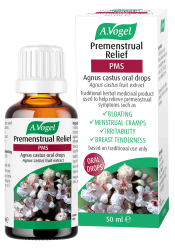An introduction to PMS
Pre-menstrual Syndrome (PMS), or Pre-menstrual Tension (PMT) as it was formerly known, is a common condition which is said to affect up to 80% of women.
It is a chronic problem which gives rise to both physical and psychological symptoms regularly each month, between the time of ovulation to the first few days of menstruation. This part of a woman’s menstrual cycle, known scientifically as the luteal phase, is associated with big changes in the levels of the two main female hormones oestrogen and progesterone.
What causes PMS?
The precise cause of PMS is still not clear but current scientific thinking strongly suggests that hormonal changes during specific points of the menstrual cycle play a significant role.
Evidence in support of this include:
- Most women suffering PMS experience symptoms at the same point of their monthly cycle
- PMS is not experienced by women who are not menstruating (eg. during pregnancy)
- Symptoms tend to be worse when big hormonal changes occur, such as during puberty (before periods start), just before the menopause, or after coming off hormonal treatment such as the oral contraceptive pill.
It is not clear why some women experience PMS whilst others don’t. One theory is that it is not so much the fluctuations of hormones which occur naturally with the menstrual cycle that causes PMS, but the relative ‘balance’ of oestrogen and progesterone that is important.
What are the symptoms of PMS?
Symptoms of PMS may be either physical or emotional. Over 150 have been described although thankfully, it is unlikely that all are experienced at once.
Nevertheless, the combination of symptoms affecting these two key aspects of health can make one feel pretty miserable until they lift.
- Emotional symptoms of PMS affect the way you think, feel and respond and can give rise to a lower ability to cope with stress, irritability, feeling fed-up or even depression
- Physical symptoms tend to affect a specific body part giving rise to bloating, acne, weight gain, food cravings, period pains and a general feeling of being tired or unwell.
Although they vary from one woman to another, what is consistent is that PMS symptoms arise in the week (or sometimes two weeks) before your menstrual period begins. Most women experience the same consistent handful of symptoms each month.
Follow the link for more detailed information on PMS symptoms.
Factors influencing PMS
Several factors are known to influence your tendency to develop PMS symptoms. These include:
- Diet – your diet can affect the degree of PMS symptoms. If you are feeling irritable or anxious, reduce the amount of caffeine you consume. If bloating is a symptom, reduce your intake of salt
- Genetics – doctors have long observed that a woman is more likely to experience symptoms if a close relative has PMS, but no clear genetic reason has been found to explain this. However, as our genes influence practically every part of our emotional and physical health, it seems unlikely that it does not play a role in PMS
- Chemical changes - changes in the levels of female hormones can influence the amount of chemicals produced in your brain. These, particularly serotonin, have a significant influence over your mood and sleep and help us understand why these emotional symptoms occur
- Depression – research suggests that women who experience low mood as part of PMS are more prone to developing some forms of depression, particularly post-natal depression, and vice-versa
- Stress – feeling under pressure at work or home can make any situation appear worse. This won’t help emotional symptoms of PMS such as irritability, anxiety or mood swings, or the ability to cope with physical symptoms such as period pain or bloating.
Diagnosis of PMS
Many symptoms described for PMS may also be experienced as part of the menstrual cycle, making it difficult in some cases for doctors to make the diagnosis of PMS.
These ‘normal’ premenstrual symptoms are mild and short lived. In general, PMS is not diagnosed until symptoms occur regularly and start to affect normal daily activities and quality of life.
There are no blood tests available to help and doctors will use a ‘clinical diagnosis’, relying on the pattern of symptoms and their experience when assessing the problem. Often, keeping a diary such as in the form of the PMS menstrual chart can help clarify matters.
My PMS Journal
Keep track of your symptoms with our PMS Diary to identify patterns & help discover ways to minimise them.








